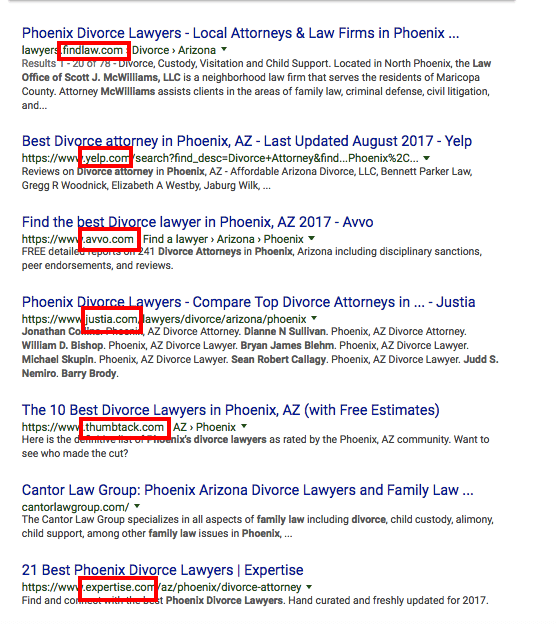Menu
August 24th, 2017
If your law firm's marketing strategy includes bringing in leads from online searches, keeping your website at the top of the search results is essential. And, with well over 50% of the clicks going to the first 3 results, it's clear that top rankings are important and sought after.

So when a marketing company comes to you and says "We can get you to #1, GUARANTEED!!" should you be listening?
Probably not.
What Should You Try to Rank for in the Search Results?
Keywords (phrases that people type into Google — and thus the searches you are attempting to rank for) vary widely in their search volume, usefulness, and competitiveness. Picking the right keywords is much more important than merely ranking #1. Anyone can rank at the top spot for an obscure keyword.
Picture this: I sell you a package guaranteeing #1 ranking for a keyword. Very easily, you could rank for the following:
"Ann Arbor Divorce Attorney That Specializes in 29 Year-Olds With 4 Kids"
The problem is clear: no one is actually searching for this! It's so far down the Long Tail (see our article on Long Tail content) that, while I can prove to you that you are #1, it's unlikely that anyone would ever see your site because they aren't searching for that phrase to begin with.
If you are working with a company that is guaranteeing rankings, make sure that the searches you are paying for are useful to your firm. There are various tools you can use to estimate search volume on a particular keyword. We start with Google Keyword Planner as part of their AdWords Tools (although you don't have to be paying for ads to use it) and use various SEO tools from there. You should be able to ask your marketing specialist for information about the volume of each search they are trying to rank for you.
Can You Beat FindLaw and Avvo?
Google is in the business of providing the best, most useful results for the people searching, so they will continue to use Google (and click on some ads in the meantime). From Google's 30,000 foot view in Silicon Valley, they have to robotically decide who really is the best personal injury attorney in Dallas. They use 3 main ways to assess rankings: links, content, and RankBrain (the last being their machine-learning algorithm which, according to Google, is the 3rd most influential ranking factor).
As you and other local attorneys are accruing a couple of links every year, major aggregation sites (i.e., in your case, sites that aggregate lots of information about attorneys and legal services) are building millions of links annually. For perspective, Avvo has an estimated 32 MILLION backlinks from around the web. Beyond this, they aren't running a law practice — their business is generating content and building more traffic to their site. It can be extremely difficult to knock these competitors from the top spots because all of their efforts are based on getting there.
For example, a search for "Phoenix divorce attorney" brings back the following spots, with 6 of the top 7 spots going to the aggregators.
A quick side note about rankings: if you can't beat 'em, join 'em. A strong SEO strategy called "Barnacle SEO" has become popular as Google continues to favor these massive sites. By ranking highly on Avvo, FindLaw, and the other aggregators, you can "attach" yourself (get it?) to their success.
Are You Willing to Put Up the Money?
Because of how valuable top search results rankings are, law firms are paying top dollar to appear high in those results. It can cost thousands of dollars to put your site in the running for higher rankings.
Further, marketing help is in a unique economic position: the idea is that if you give an agency $1, they will generate $2, or $5 or $10. Both sides come out ahead, and so the business continues to grow. As with any booming business, it attracts all kinds of participants with different skill levels and ethics.
Thus wading into any marketing endeavor is risky. Do it right, or it's best to keep your money with you. Make sure that you are fully committed — and you have a plan with your agency — before starting any campaign.
Black Hat Marketing Dangers
Indeed, law firms should be wary of "black hat" marketing schemes. Such schemes attempt to game Google search algorithms to temporarily get high rankings for your website. But, because Google has flagged such methods as gaming the system instead of contributing to fair competition, they ultimately have a high potential to damage your domain beyond repair. Fall in with the wrong agency, and they may use nefarious means to get your website ranking high. You are temporarily happy; they get paid; and, the next thing you know, Google blacklists or penalizes your domain name.
Why does this matter? Your domain name is your main URL (like www.themodernfirm.com). Although your website text and design may change from month to month and year to year, your domain name doesn't — it's the central asset of your online persona. You don't want it damaged, so you should know what to look out for.

- Keyword stuffing: unnaturally repeating your desired keyword over and over in the text of your site.
- Buying links: since links from other sites back to your site are so valuable for SEO, marketers may buy links from other sites to boost your rankings. This is a no-no. (But buying links directly isn't the same as paying an agency to build quality inbound links for you. You just shouldn't be paying another website directly for links.)
- Tiny or hidden text: a bit of an outdated scheme, webmasters used to add hidden (or nearly so) links and keywords. For example, they would make the font of the text the same color as the background of the site, so a human reader would see a normal-looking site, but Google's bots — which read the code behind the site — would read a wall of SEO-boosting words (perhaps even ones you can't ethically use to promote your practice, such as "best divorce lawyer in Detroit").
- Many, many, many more.
Be 100% sure about the tactics your agency is using to increase your rankings. Negative efforts can affect your domain forever.
Google is Always Changing
Google makes an estimated 1,000 changes a year to their algorithm. Further, it now customizes search results based on individual users' behavior and geographic location. So while you may be #1 on a particular day — or even just on your particular screen — your ranking may well change tomorrow.
Google will tell you an average of your rankings for specific keywords in their Google Webmaster Tools. But the days of you being a set position are over. Your rankings change from minute to minute, creating a potentially difficult situation when your agency charges you for a #1 spot but you are no longer there.
So What Should I be Looking for?
As we mentioned at the top of the article, having great rankings will be an important part of your online marketing profile. But, with so many potential landmines, you want to be cautious of any guaranteed rankings. Here's what you should consider:
- Openness of information: many agencies will keep their efforts and the results hidden from plain view, instead assuring you they're "doing SEO work" and not adequately explaining their results. You yourself should have access to the Analytics account for your site and know what metrics are being measured. You also have every right to ask your agency what, exactly, they are doing for you. Keep in mind that SEO can take a while to implement and to meaningfully impact rankings: good organic SEO is a long-term solution. (If you want a short-term solution, Google will happily allow you to pay your way into the ads section of the results page.)
- What's the plan? A proper SEO plan is comprehensive. You should look at the whole picture, including the content (existing, core content as well as ongoing additions), building legitimate links to your site, how your pages are structured and labelled for web browsers, and more. Your agency should have a view of the efforts they are going to work on in a span of months, not days.
- Absolutely no black hat tactics: While you can easily achieve ranking wins with nefarious means, you are putting your domain at long-term risk of abolishment from the search engines.
- Increase in traffic and leads: At the end of the day, the goal is more clients. If the firm is receiving more calls and good online leads, you know that the additional rankings are bringing you the clients you want.
The Modern Firm can help you build a comprehensive vision for your online marketing. Reach out to us at marketing@themodernfirm.com and we'll happily evaluate your current and future efforts to build your client base further.





